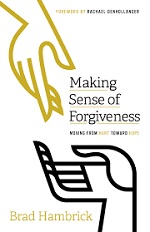Christians know forgiveness is essential. We are told to forgive as God forgives us. But forgiveness is hard. It's not a momentary experience as there are feelings and other aspects that remain after making the choice to forgive. Hambrick helps those of us stuck on that road of forgiveness.
He covers topics like obstacles to forgiveness, what forgiveness is and isn't, which kinds of acts require forgiveness and which don't (we forgive sin, excuse mistakes, overlook quirks), and what forgiveness means for future relationships. “Forgiveness does not commit me to an unwise or destructive pattern of relating.” (51) I appreciate that Hambrick says forgiveness is not ignoring the hurt, it is not letting the culprit off the hook, it is not forgetting, and it is not necessarily trust or reconciliation. It is understanding God's forgiveness in new ways and remembering gracefully.
I am not sure this book is suitable for the average Christian. I found Hambrick's writing style a bit complex and hard to understand at times. There were some sentences I had to reread a few times to grasp the meaning. The text has more of a psychological bent and may be best read by professionals in the field.
There is one area where I would urge caution. Hambrick writes, “...unless we repent (a condition), God does not forgive.” (30) I have images of laying awake as a child, going over my day, trying to ask forgiveness for every misdeed lest I die in my sleep and be sent to hell for a sin I failed to remember. I find it interesting that he includes a chapter for professionals about individuals who have an obsession, such as continually asking for forgiveness. (137) I can see how such an obsession could form considering Hambrick's emphasis on the condition of repentance for forgiveness as quoted above.
I would rather we pay attention to Jesus asking God to forgive those who crucified Him because they did not know what they were doing. (Luke 23:34) I would also like to think that Jesus is doing the same for me now, interceding for me when I fail to remember a sin and repent of it. (Rom. 8:34) Trusting Jesus' continual intercession for us may help relax that obsession of trying to remember every sin to assure repentance and forgiveness.
This might be a good book for Christian counseling professionals to read to understand the complexities of forgiveness and to help people go through the entire process. In fact, there is a section in the book specifically for pastors, counselors, and church leaders. If a lay person plans to read this book, I suggest another be asked to read along. An objective co-reader could help clarify some of the author's ideas and suggestions. There are questions at the end of each chapter to help readers reflect on the material.
My rating: 3/5 stars.
Brad Hambrick serves as the Pastor of Counseling at The Summit Church in Durham, NC. He also serves as Assistant Professor of Biblical Counseling at Southeastern Baptist Theological Seminary, a council member of the Biblical Counseling Coalition, and has authored several books. He holds a M.Div in Biblical Counseling and Th.M in applied theology from Southeastern Baptist Theological Seminary.
New Growth Press, 160 pages.
I received a complimentary egalley of this book from the publisher. My comments are an independent and honest review.
(My star ratings: 5-I love it, 4-I like it, 3-It's OK, 2-I don't like it, 1-I hate it.)


No comments:
Post a Comment